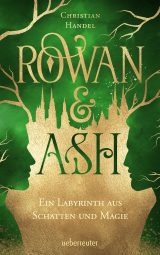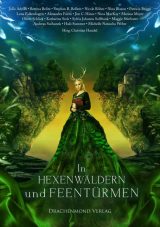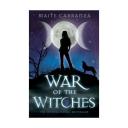 It’s a pleasure to share with you the interview with spanish writer Maite Carranza, author of the “War of the Witches” trilogy.
It’s a pleasure to share with you the interview with spanish writer Maite Carranza, author of the “War of the Witches” trilogy.
The books tell a great coming of age-story of a young witch, which is far away from Harry Potter!
If you want to read Mrs Carranzas answers in English and if you’re interested in her writing live, her thoughts on the story itself and her opinion about witches – here you go!
Interview with Maite Carranza
Maybe we could start with you introducing yourself in a few sentences?
I’m a story teller, I’m a teacher, I’m a mother, I’m a traveller, I love books, movies and mountains, and I swim every day. That’s my life.
For those who haven’t read your War of the Witches-trilogy yet: Could you give a few hints about what the reader awaits within this novels?
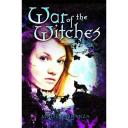 It’s a modern witch story, it’s an exciting adventure, an epic and romantic novel, but it is a family story, too. The conflicts are built around the relationship of three generation of women. The young girl (the main character), her mother and her grandmother. Like all families they hide terrible secrets.
It’s a modern witch story, it’s an exciting adventure, an epic and romantic novel, but it is a family story, too. The conflicts are built around the relationship of three generation of women. The young girl (the main character), her mother and her grandmother. Like all families they hide terrible secrets.
While reading the second book of the series I realized that you must have pretty much planned out the overall story arc of the book from early one. So while writing the 2nd and the 3rd novel did everything go according to the plan?
Sure. In general the structure of the story went according to the plan, but I changed some characters, especially Christine Olav, because they had their own temperament and they forced me to write their real story. I added some new situations too and I travelled to some countries that I didn’t plan to go to before.
Although witchcraft plays a major role in the trilogy, it’s far away of being a Harry Potter-copy. In your world to perform magic seems to be mainly a women’s privilege. Why is that? And do you think your novels are therefore girl’s books?
I think witchcraft is not a woman’s privilege, it’s a woman’s curse and thousands of women in Europe died for it. I wanted to write about them. In Spain, the tradition of witchcraft was a tradition of women.
What fascinates you on witches?
They are the only fantastic beings that really have existed. Do you know any other fairy creature that has been condemned to be burned at stake?
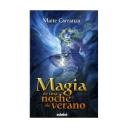 How did you come up with the idea of Erzebet Bathory being an Odi?
How did you come up with the idea of Erzebet Bathory being an Odi?
First I invented the Odish and by chance I came across Erzebeth Bathory. Then, I realized that she was really Odish and I decided to add her to my story. She killed 650 young girls to drink their blood and to bathe in it because she wanted to be young, beautiful and immortal. Like my Odish.
You decided to place your story arc in the real world. During the trilogy we visit places in Spain, Hungary, Island, Italy and even South America. Was that more fascinating for you than creating a separate universe as this is done by a lot of fantasy authors?
I studied anthropology at the university and I think that our world is so interesting, surprising and exciting like fantasy worlds. I researched about cultures that practiced witchcraft and I tried to write about them. Inuits, samis and other ancient cultures who had conserved ancestral behaviours. It was so much more fascinating than creating a new magic world.
Do you think your readers are different in different parts of the world?
Essentially they are different, but they are similar, too. Experience has assured me that everyone has heard about witches. Witches are universal and they are the key to the success of the books.
La maldiciónde Odi concludes the story of Anaíd (or so it seems). Is that true? And even if so, do you think you will visit that world some day again?
The story has definitively ended, because the war of the witches has come to an end at last. But one reader suggested to me to write about the past of Demeter, the grandmother of Anaid. I thought that it was a good idea. If in the future I need to explain something more about witches and their magic world I have a character to write about.
Do you have one favourite scene in all your books, or one you’re really proud of?
I’m proud of the scene of the meeting in Crete. While I was writing the last book I felt that the story needed one cathartic scene to change the direction of the plot because I didn’t agree with Omar’s victim attitude. Suddenly, one afternoon I wrote this chapter without a scheme and I found the meaning of the Omar story. I realized that they were wrong because they lived in fear of the Odish and refused to fight. The real meaning of the arrival of the Chosen One is not the force of her power, but the change of her tribe’s mentality. When I understood that it was like a revelation.
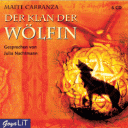 How do you like the cover art of the German editions of your novels. And how important do you think is cover art nowadays?
How do you like the cover art of the German editions of your novels. And how important do you think is cover art nowadays?
Nowadays, images and covers are very important concepts. I love the German covers. They offer mystery, adventure and fantasy. They appeal to me.
What else is planned from the author Maite Carranza?
I have just published a new novel. It’s a humorous, magical story about a girl and a boy who are studying English one summer in Ireland. You can find love, fairies and misunderstandings. The feedback of the readers shows they found it funny. I needed to laugh after writing for three years about a serious subject like witchcraft.
Maybe you could tell us a little bit about your process of writing a novel? How’s an oridinary working day like?
I’m a screenwriter, so I work with the same techniques as creating a film. I write a synopsis, a treatment and after that I organise all my information in chapters. Only when I have the structure, the plots, can I clearly see and hear the characters do I write the book.
On a normal day I usually get up at 7 in the morning and tackle the usual household chores, and then I take my children to school. I go swimming at 8.30 and I’m sitting in my chair ready to work at 9.30 and write for six hours more or less. Then, at 4. 30 I’m back to being a perfect mother and housewife and I do the school run again!!!, I do homework (my son’s not mine) and I prepare the dinner.
Anything you really loathe during the creation of a novel?
Noise.
What do you feel is the key element in creating vivid worlds and believable characters?
The characters have to be complex to be believable.
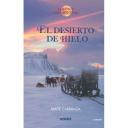 Does your publisher ask or even demand that you make rapid changes on your books? Have you ever had to make dramatic changes?
Does your publisher ask or even demand that you make rapid changes on your books? Have you ever had to make dramatic changes?
I had this experience in my screenwriting. I have changed a lot of things because directors, producers and actors have their own opinions about the films. Once, one producer asked me to change the sex of the main character. He preferred a boy, not a girl. It was too much and I left the job.
Can you remember what your first story (or novel) was about? And how did you realise you have a talent for writing?
My first novel was a humorous story for children played by a girl and a boy who wanted to travel to Kathmandu on a crazy trip. It was successful and it received the Critics Award of Catalunya for children’s books. It was the most important moment in my career. It was the critics, not me, who decided that I had talent for writing.
If you could meet a fictional character (from your own work or another) who should it be and why?
Julien Sorel. The main character of Le rouge et le noir, a novel of Stendhal. I read it when I was young and he fascinated me because he was an unscrupulous, ambitious Latin lover.
Is there a novel (from another author) you wish you had written?
Ali y Nino. One historic novel by Kurban Said that takes place in Baku during the First World War. It’s so fresh, so poetic and so moving, too … It’s wonderful.
Is there a question you always wanted to get asked in an interview, but it never occurred? Now is your chance. What question would it be and please give us an answer as well.
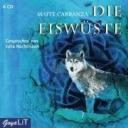 Nobody has asked me if my life as an author would be different if I was a man. My answer is ABSOLUTELY YES. Sometimes I compare my life with my male writer friends and I feel jealous. They don’t have any other problem than writing. All of them have fantastic wives who resolve their domestic, physical, mental and family troubles.
Nobody has asked me if my life as an author would be different if I was a man. My answer is ABSOLUTELY YES. Sometimes I compare my life with my male writer friends and I feel jealous. They don’t have any other problem than writing. All of them have fantastic wives who resolve their domestic, physical, mental and family troubles.
I’m proud to be women, but it is so tiring!!!
Thank you so much for your time and for being so kind to answer these questions!
All the best for your novels and both for your working and your private life!
